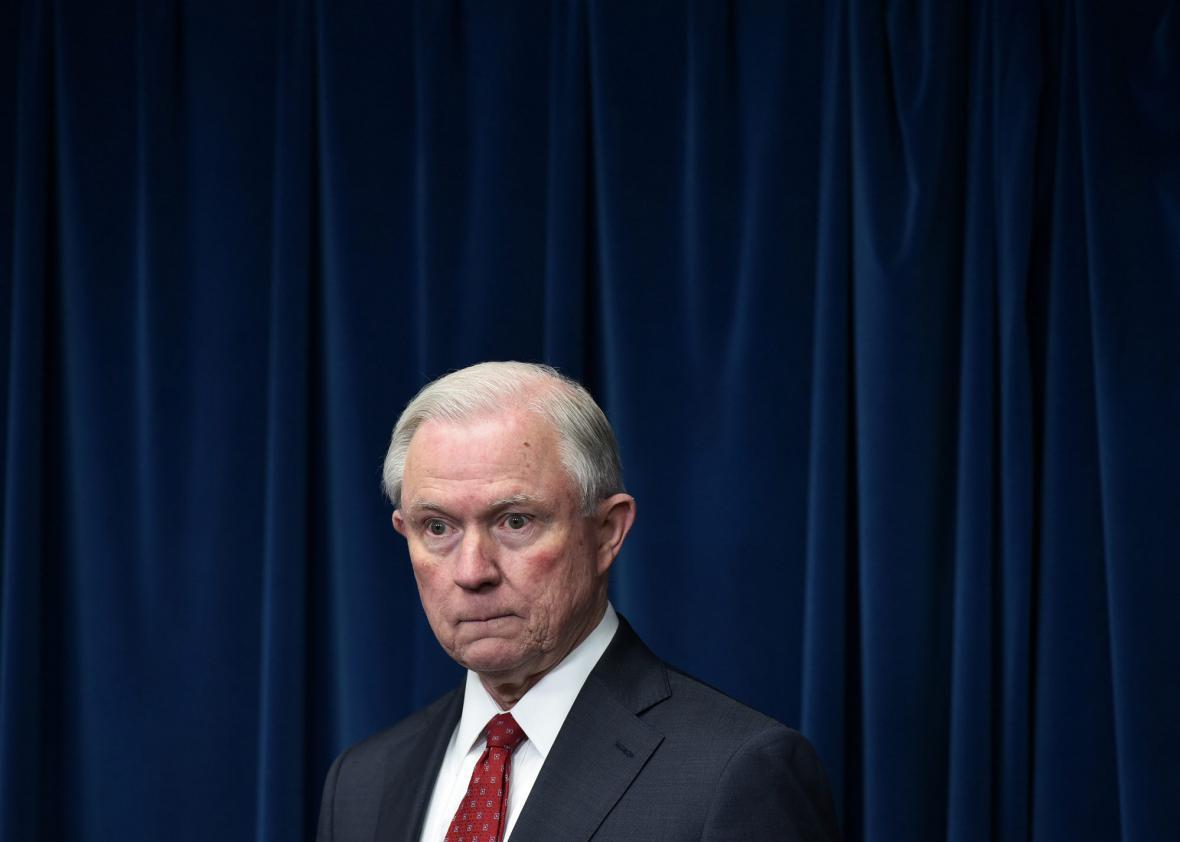The Trump administration’s ouster of more than 40 U.S. attorneys late last week had all the trappings of a dramatic gesture. It looked, to the untrained eye, like an extraordinary political purge with dozens of Obama-era appointees getting deposed by a perpetually norm-violating Republican president bent on replacing them with loyalists.
The reassurances came quickly from the media as well as the Department of Justice: There was nothing unusual about a new president making room for his own squad of prosecutors. This was true enough: Trump’s predecessors, including Barack Obama and Bill Clinton, had done the same thing, and with the exception of Preet Bharara in the Southern District of New York, who had reportedly been told he could keep his job, the 46 prosecutors in question weren’t particularly surprised to get the boot. While Trump put his own spin on the tradition by demanding resignations be handed in immediately, the underlying idea behind the move—that a president and his attorney general should bring in their own federal prosecutors—is widely accepted in Washington as standard operating procedure.
That doesn’t mean it makes sense. As every U.S. attorney will tell you, the job of enforcing the law is supposed to be apolitical. In theory at least, the key decisions a federal prosecutor makes—namely, who to charge and with what—must not be informed by ideology or partisanship. Why, then, are we supposed to shrug when the president dismisses an entire group of prosecutors just because they were appointed by the opposing party? To accept this as normal and necessary is to accept the premise that prosecutors aren’t independent at all, and that their bosses at the White House and the DOJ fully expect them to behave in a partisan manner. If they didn’t believe their prosecutors would behave like partisans, then the president and the attorney general wouldn’t feel the need to install their “own” people in those jobs, and they certainly wouldn’t push the last guy’s appointees out the door with no warning.
Expecting consistency on this point might be a fool’s errand. As Stanford legal historian Norman Spaulding put it in a 2008 paper, there has always been, in discussions of the DOJ, “a distinct tendency for solemn insistence on independence to be followed almost immediately by a concession that politics inevitably influences [it].” Still, shouldn’t it matter at least a little bit that the people running our federal justice system claim to pride themselves on being apolitical?
In interviews over the last few days, three recently deposed U.S. attorneys forcefully rejected the idea that their approach to law enforcement is defined in any way by the party affiliation of the president who appointed them.
Michael Ormsby, who became the U.S. attorney for the Eastern District of Washington in 2010 and submitted his resignation on Friday, told me he often thinks of a meeting he and other newly appointed U.S. attorneys had with Obama. The president told them to remember, Ormsby recalled, that they did not serve his administration but rather the people in their districts. “He said, ‘Some of you got these jobs in part because of who you know, and part of that was political. But the politics stops now,’ ” Ormsby said.
John Vaudreuil, who served as U.S. attorney for the Western District of Wisconsin until Friday, said he attended the same meeting and that he took Obama’s remarks to heart. While he knew he’d be clearing out his desk after Trump won the presidency, Vaudreuil had a hard time explaining the rationale behind his dismissal. The unavoidable implication, he agreed, was that the new administration didn’t trust him to make unbiased decisions because he was an Obama appointee. “It’s offensive,” Vaudreuil said. “We make decisions every day based on the facts, without fear of anybody, without favor to anybody.” After 37 years working as a federal prosecutor and holding himself to that standard, he said, it makes little sense “to then have somebody say, ‘Well, I gotta tell you something, since you’re a political appointee, we think you’re gonna [put your thumb on] the scale.’ ”
Walt Green, who resigned Friday as U.S. attorney for the Middle District of Louisiana, echoed that sentiment, saying he had spent his career properly and neutrally following orders, and would have continued to do so if he’d been allowed to keep his job. “The public and even my friends and even my family don’t know if I belong to a political party or if I’m an independent or whatever,” Green said. “I can tell you [the Trump administration] would have had only success in my office if I was still there.”
Green, like the other newly unemployed U.S. attorneys I spoke to, acknowledged that different administrations have different enforcement priorities and that those priorities will inevitably be informed by political beliefs. Eric Holder was certainly informed by his liberal worldview when he wrote a memo in 2013 instructing federal prosecutors to avoid certain mandatory minimums when making charging decisions. So, too, was John Ashcroft informed by his conservatism in writing a memo 10 years earlier urging his prosecutors to charge the most serious provable offense.
Realistically, it’s fair to say all policy emanating from the Justice Department is going to be political on some level. As Dahlia Lithwick and Jack Goldsmith argued in Slate back in 2007, it’s senseless to pretend or even wish it were otherwise. In that light, the ritual of dismissing the other side’s U.S. attorneys represents a concession to reality.
And yet, there’s an extreme dissonance between what that practice implies—that for all their lofty claims of independence, politically appointed prosecutors are always going to be political—and the standard of “independence” law enforcement officials are supposed to observe. Maybe it’s naïve to dwell on this dissonance and to act surprised at the charade it exposes. Insisting on the charade of prosecutorial independence, while treating the ritual firing of “independent” prosecutors as perfectly proper and logical, seems worse.
